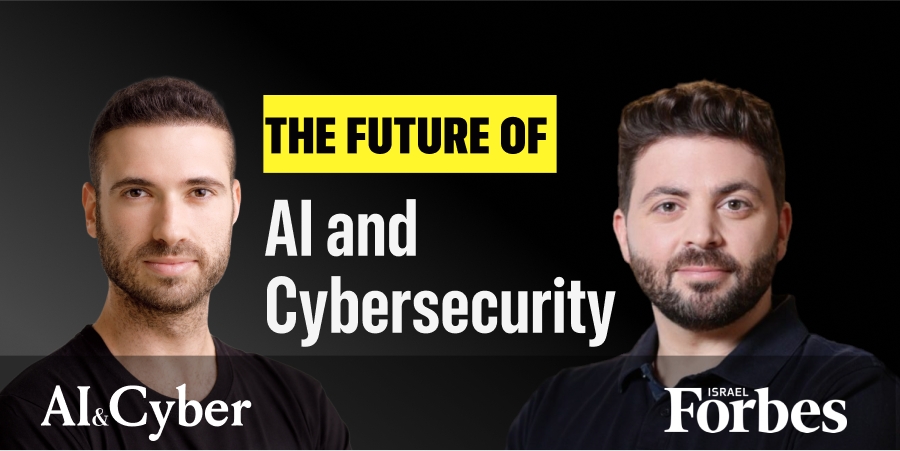Cybersecurity has never been more exciting—or critical—than it is today, driven significantly by the transformative power of artificial intelligence (AI). In a recent conversation with Liran Grinberg, Co-founder of Team8, my understanding deepened about the profound changes AI is bringing to cybersecurity. Grinberg’s journey, beginning in Israel’s elite Unit 8200 and culminating in co-founding Team8, a venture group managing over $1 billion uniquely positions him to understand the evolving landscape of cybersecurity innovation.
As someone deeply entrenched in AI and cybersecurity myself, I share Grinberg’s enthusiasm. Every morning, I wake up with anticipation, aware that new opportunities—and threats—are emerging at an unprecedented pace. “It’s an amazing time to be an entrepreneur, an even better time to be a venture capitalist because there are so many incredible founders doing amazing things,” Grinberg told me. “And it’s an even more exciting time to be doing this specifically in cybersecurity.”
Reflecting on the dynamic relationship between technology advancements and cybersecurity, Grinberg emphasized the fundamental shift AI has brought: “With AI, we’re doing things previously impossible. Unlike cloud or SaaS, AI allows entirely new capabilities. This increases the attack surface, creating huge opportunities for new cybersecurity solutions.” This resonates strongly with my own experience at Clarity, where we’ve witnessed how rapidly AI has both expanded the threat landscape and enhanced our ability to defend against sophisticated attacks.
The implications for organizations, and especially CISOs, are profound. The traditional, reactive cybersecurity models are becoming obsolete. Grinberg highlights the new roles cybersecurity professionals will adopt, explaining how analysts and security personnel will increasingly become supervisors of AI-driven agents performing operational tasks. “Analysts will become like shift managers, overseeing AI agents handling most operational tasks,” he noted. This aligns with my perspective at Clarity, where proactive AI integration has already shown significant benefits in preventing sophisticated threats, including AI-driven phishing and deepfakes.
This evolution also underlines the critical importance of momentum and market speed, a point Grinberg firmly emphasized. “Cybersecurity, especially at the early stage, is extremely competitive,” he explained. “Speed and market momentum are crucial. There’s no slow way to build today, especially in cyber. Decisions must be fast and responsible, quickly capturing market leadership.” His insights align closely with the rapid evolution I witness daily at Clarity, where being ahead of threats is not just advantageous—it’s mandatory.
The rapid and widespread adoption of AI technology presents both extraordinary opportunities and unprecedented risks. Organizations face an accelerated expansion of their digital footprint, increasing their vulnerability to complex cyberattacks. Grinberg emphasized the significance of domain expertise in navigating this new reality: “Domain expertise remains critical and is here to stay. Cybersecurity is deeply technical, complex, and demands a high level of expertise, especially when integrating AI solutions.”
This perspective resonated deeply with my own experiences at Clarity. Without a nuanced understanding of cybersecurity threats and AI capabilities, even the most innovative technology risks becoming ineffective or misaligned. Organizations need deep domain knowledge not only to implement effective cybersecurity strategies but also to anticipate emerging threats in real-time.
Grinberg’s vision for cybersecurity innovation involves leveraging AI for both defense and strategic growth. “We at Team8 established an AI Excellence Center to support this critical transformation across our portfolio,” he explained, underscoring how strategic AI integration—not just superficial adoption—will determine future success.
Our discussion reaffirmed my conviction that cybersecurity must rapidly shift from passive detection to proactive, predictive, and preventive strategies. This proactive shift, facilitated by AI, is no longer a luxury but a necessity. Organizations hesitating to embrace AI-driven cybersecurity strategies risk becoming dangerously vulnerable in an increasingly complex threat landscape.
As I reflect on my conversation with Grinberg, it’s clear that AI represents both unprecedented risk and unparalleled opportunity. Organizations embracing AI deeply within their security infrastructure can expect unparalleled resilience and efficiency. Those that resist or delay will find themselves increasingly vulnerable in the rapidly evolving threat landscape.
The choice is clear and urgent: embracing AI-driven cybersecurity is essential. As Grinberg emphasized, organizations must integrate AI strategically into their core operations or risk falling dangerously behind. The future of cybersecurity is proactive, dynamic, and deeply intelligent.
Michael Matias is the CEO and Co-Founder of Clarity, an AI-powered cybersecurity startup backed by venture capital firms including Bessemer Venture Partners and Walden Catalyst. Clarity develops advanced AI technologies protecting organizations from sophisticated phishing attacks and AI-generated social engineering threats, including deepfakes. Before founding Clarity, Matias studied Computer Science with a specialization in AI at Stanford University and led cybersecurity teams in Unit 8200 of the Israel Defense Forces. Forbes Israel recognized him early on, naming him to the exclusive 18Under18 list in 2013 and the Forbes 30Under30 list thereafter. Matias authored the book Age is Only an Int and hosts the podcast 20MinuteLeaders.





